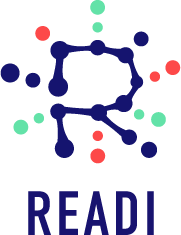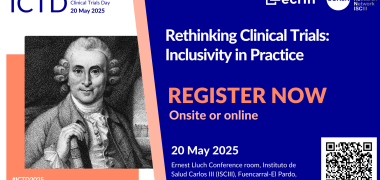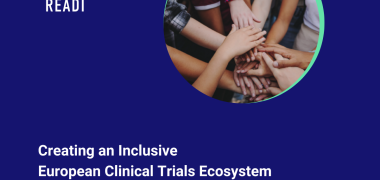READI
Research in Europe and Diversity InclusionFunding programme: IHI JU (N 101166227)
Budget: €66.8M
Coordinator: SERMAS (Servicio Madrileño de Salud), through Hospital Universitario La Paz in Spain, Novartis in Switzerland, and supported by The Synergist in Belgium.
Duration: 6 years (Jan 2025 - Dec 2030)
The READI project aims to promote a less fragmented and more democratic ecosystem for clinical studies (CS) by engaging key stakeholders in the process of including underserved and underrepresented populations in CS.
The consortium is coordinated by the Servicio Madrileño de Salud (SERMAS), through Hospital Universitario La Paz, as the Project Coordinator, Novartis as the Project Lead, and supported by The Synergist as the Digital & Sustainability Coordinator. This project brings together a highly multidisciplinary consortium of 73 organizations from 18 different countries. The six-year project will have a budget of €66.8 million, of which €31.5 million is requested to be funded by IHI, and €34.2 million is committed by industry and contributing partners.
READI’s main objective is to enhance the representativeness of underserved populations in clinical studies by fostering a more cohesive and integrated clinical study ecosystem, with the ambition of achieving full inclusion by placing the patient at the center. It will actively connect key stakeholders involved with underserved and underrepresented communities, and equip them with the necessary tools, training programs, and strategies essential for recruiting and retaining underserved and underrepresented patients in clinical studies. To demonstrate READI’s capacity to broaden representation in clinical research, the approaches will be tested in real-world pilot clinical and non-clinical use cases, supported by industry partners.
The work will include mapping the characteristics of these populations using Real-World Data (RWD), developing standardized descriptors for their inclusion, collecting insights and informing regulatory and Health Technology Assessment (HTA) policies to enhance representativeness in clinical studies.
READI will help underserved and underrepresented communities overcome barriers to clinical study participation, such as lack of information or awareness, mistrust, poor communication, geographic limitations, and prejudice. In addition, READI will design and implement a patient-centered, open, and innovative digital platform. This platform will improve access to clinical study information and READI tools, while fostering patient connections with established communities.
Ultimately, this initiative will lead to more innovative science and will improve inclusive participation in clinical trial research thereby promoting health equity in Europe.
ECRIN's role in READI
ECRIN is co-leading the work package on protocol design and clinical operations with Novartis and Roche. This will include the provision of guidance on how to use key data to identify the study population; the mapping of the already identified design and operational features for inclusivity including gap analysis; the evaluation of existing tools and the development of new approaches; the creation of a framework for monitoring and evaluation of the impact of inclusive CS strategies; and the creation of a centralised toolkit to support study teams to integrate inclusive practices into their design and conduct, analysis and reporting.
ECRIN will also contribute to the identification of barriers and facilitators for inclusivity in CS in Europe.







